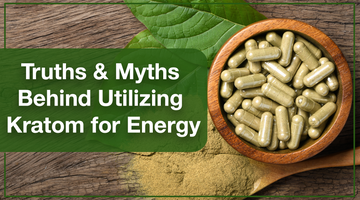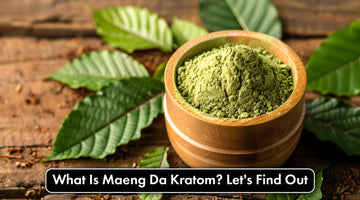
In recent years, the use of Kratom has gained popularity as a natural remedy for various purposes, including boosting energy levels. However, as with any herbal supplement, there are both truths and myths surrounding its utilization.
This blog aims to shed light on the history of Kratom, the process of its production, the diverse range of users, and the common misconceptions associated with its consumption.
History of Kratom
Kratom, scientifically known as Mitragyna speciosa, has a long and storied history deeply rooted in Southeast Asian cultures. Indigenous to countries like Thailand, Indonesia, Malaysia, and Papua New Guinea, Kratom has been used for centuries by locals as a traditional medicine, folk remedy, and stimulant.
Traditionally, the leaves of the Kratom tree were chewed or brewed into a tea to alleviate fatigue, enhance productivity, and alleviate pain. In recent years, however, Kratom has gained popularity beyond its native regions, with a growing number of people around the world exploring its potential benefits, especially for boosting energy.
Who Uses Kratom?
Kratom has found a diverse user base, attracting individuals from various backgrounds seeking its alleged energy-boosting effects. While some turn to Kratom for its potential to enhance focus and productivity, others explore its analgesic properties or its purported ability to alleviate symptoms of anxiety and depression.
It's important to note that the reasons for Kratom use can vary significantly, and individuals might have different experiences based on factors such as dosage, personal health, and the specific strain of Kratom consumed.
How Is Kratom Produced?
Kratom is derived from the leaves of the Mitragyna speciosa tree, which belongs to the coffee family. The leaves contain active compounds called alkaloids, with mitragynine and 7-hydroxymitragynine being the most notable. These alkaloids are believed to be responsible for Kratom's potential effects.
The process of producing Kratom involves harvesting the leaves, drying them, and then grinding them into a fine powder. Different strains are created based on the region in which the tree grows, and the drying process can also influence the characteristics of the final product.
Myths and Truths About Kratom
Kratom Is Not Addictive
Truth: While some users have reported experiencing withdrawal symptoms when discontinuing Kratom use, the addictive nature of Kratom remains a subject of debate. The degree of dependence may vary among individuals, and factors such as dosage and frequency of use play a role. It's crucial for users to approach Kratom with caution and be aware of the potential risks associated with regular use.
Kratom Gets You High
Myth: Despite misconceptions, Kratom does not induce a typical "high" as seen with substances like marijuana or certain synthetic drugs. Instead, Kratom is known for its subtle, mood-enhancing effects and its potential to increase alertness and focus. The experiences can vary widely among users, and the effects are generally considered mild compared to traditional recreational drugs.
Kratom Is a Synthetic Drug
Myth: Kratom is a natural substance derived from the leaves of the Mitragyna speciosa tree. It is not a synthetic drug. However, due to its psychoactive properties, it has faced scrutiny from regulatory bodies in some regions. It's essential for users to obtain Kratom from reputable sources to ensure its purity and quality.
Kratom Has No Advantages
Myth: While the scientific research on Kratom is still evolving, anecdotal evidence suggests that it may offer various benefits, including increased energy, improved mood, and relief from certain ailments. However, individual responses can differ, and more rigorous research is needed to establish the full range of Kratom's potential advantages.
Kratom Functions Like Other Drugs
Myth: Kratom's mechanism of action differs from that of other drugs. Its alkaloids primarily interact with opioid receptors, but the overall effect is more complex, involving additional receptor systems. Drawing direct comparisons to other substances oversimplifies Kratom's pharmacology and may contribute to misunderstandings about its effects.
There Is No Risk of Overdose with Kratom
Myth: While fatal overdoses solely attributed to Kratom are rare, it is not entirely risk-free. Excessive doses can lead to adverse effects such as nausea, dizziness, and respiratory depression. Individuals should exercise caution, adhere to recommended dosages, and be aware of their tolerance levels to mitigate potential risks.
Kratom Does Not Cause Side Effects
Myth: Like any substance, Kratom is associated with potential side effects. These can include nausea, constipation, dry mouth, and, in some cases, more severe effects at higher doses. Users should be mindful of their intake and pay attention to how their bodies respond to Kratom.
Right Way to Use Kratom
Using Kratom responsibly is essential for maximizing potential benefits and minimizing risks. Here are some guidelines:
- Start with a Low Dose: Begin with a small amount to gauge your individual response.
- Choose Quality Products: Purchase Kratom from reputable sources to ensure purity and potency.
- Stay Hydrated: Dehydration is a common side effect, so drink plenty of water.
- Avoid Mixing with Other Substances: Combining Kratom with other substances can amplify risks and side effects.
- Monitor Usage: Regularly assess your Kratom use and consider breaks to avoid dependence.
FAQs
What is Kratom?
Kratom is a natural substance derived from the leaves of the Mitragyna speciosa tree, native to Southeast Asia. It contains alkaloids that interact with receptors in the body, producing various effects.
How Does Kratom Work for Energy?
The alkaloids in Kratom, particularly mitragynine, interact with receptors in the brain, potentially leading to increased energy, focus, and alertness.
Is Kratom Legal?
Kratom's legal status varies globally and within different regions. Some countries and states have banned or regulated its use, while others allow it for personal consumption. Users should be aware of and comply with local regulations.
In conclusion, understanding the truths and myths surrounding Kratom is crucial for those considering its use for energy or other purposes. While it may offer potential benefits, responsible usage and awareness of potential risks are paramount. As research on Kratom continues, users should stay informed and approach its consumption with a well-informed and cautious mindset.




